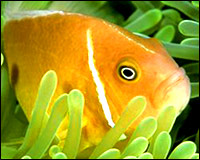
Drew Weiner.
With what environmental organization are you affiliated?
I’m the director of Reef Protection International.
What does your organization do?
RPI contributes to coral-reef conservation by educating the public about the marine aquarium trade and helping consumers make responsible, “reef-safe” buying choices.
Coral reefs are in crisis due to warming seas, pollution, and overfishing. Although on a much smaller scale, the marine aquarium trade compounds the stress already placed on the world’s coral reefs with cyanide use, over-collection, and high mortality in shipping.
What are you working on at the moment?
We are putting the finishing touches on our Reef Fish Guide, a pocket-sized buying guide for the home aquarium hobbyist. It provides clear advice on recommended saltwater fish for the home aquarium and specifies those that are best to admire on the reefs or at the public aquariums.
How do you get to work?
I work mostly from home and travel via public transit and my motorcycle for meetings around town. When I need to drive outside of San Francisco, I use Flexcar, a car-sharing service.

Photo: Reef Protection International.
What long and winding road led you to your current position?
Oh boy! The short version is that I spent 13 years in corporate sales/marketing, was one of the early dot.bomb victims here in Silicon Valley, took a year off to travel and write about international environmental projects, went back to get my master’s in my mid-30s, and then began my second career by doing marine conservation work in the Galapagos.
Where were you born? Where do you live now?
Born in Santa Monica, Calif., I moved to San Francisco in 1995 and have called this city home ever since.
What’s been the best moment in your professional life?
When I traveled around the world as a photojournalist for an online magazine called Eco-Odyssey (now offline). I met amazing people who, in the face of abject poverty and societal scrutiny, were still making a stand for nature. They inspired me to join them in this work and changed my life forever.
What environmental offense has infuriated you the most?
Well, we’re in the middle of it right now. Rep. Richard Pombo (R-Calif.) wants to gut the Endangered Species Act. The ESA is arguably the most important contribution the United States has made to the conservation of endangered species worldwide.

Sangduen (Lek) Chailert.
Photo: Drew Weiner.
Who is your environmental hero?
Her name is Sangduen (Lek) Chailert and she runs Elephant Nature Park outside of Chiang Mai, Thailand. She is the strongest voice for nature that I’ve ever met.
What’s your environmental vice?
My motorcycle. As much as I’d like to sever myself from the petroleum teat, I still am connected, though ever so slightly. The other is that I still eat dairy products — I just can’t get enough of cheese.
How do you spend your free time (if you have any)?
I like to SCUBA dive, play softball, hike, catch live music around town, travel, and spend time with friends and family.
What’s your favorite place or ecosystem?
Coral reefs, of course. Second to that are kelp forests … a very close second.
Who was your favorite musical artist when you were 18? How about now?
In 1984, U2. Now, Ben Harper.
What’s your favorite TV show?
Movie?
If you could have every InterActivist reader do one thing, what would it be?
Every time you think of buying something, ask yourself, “Do I really and truly need this?” If the answer is no, then don’t buy it. Simply put — consume less!


